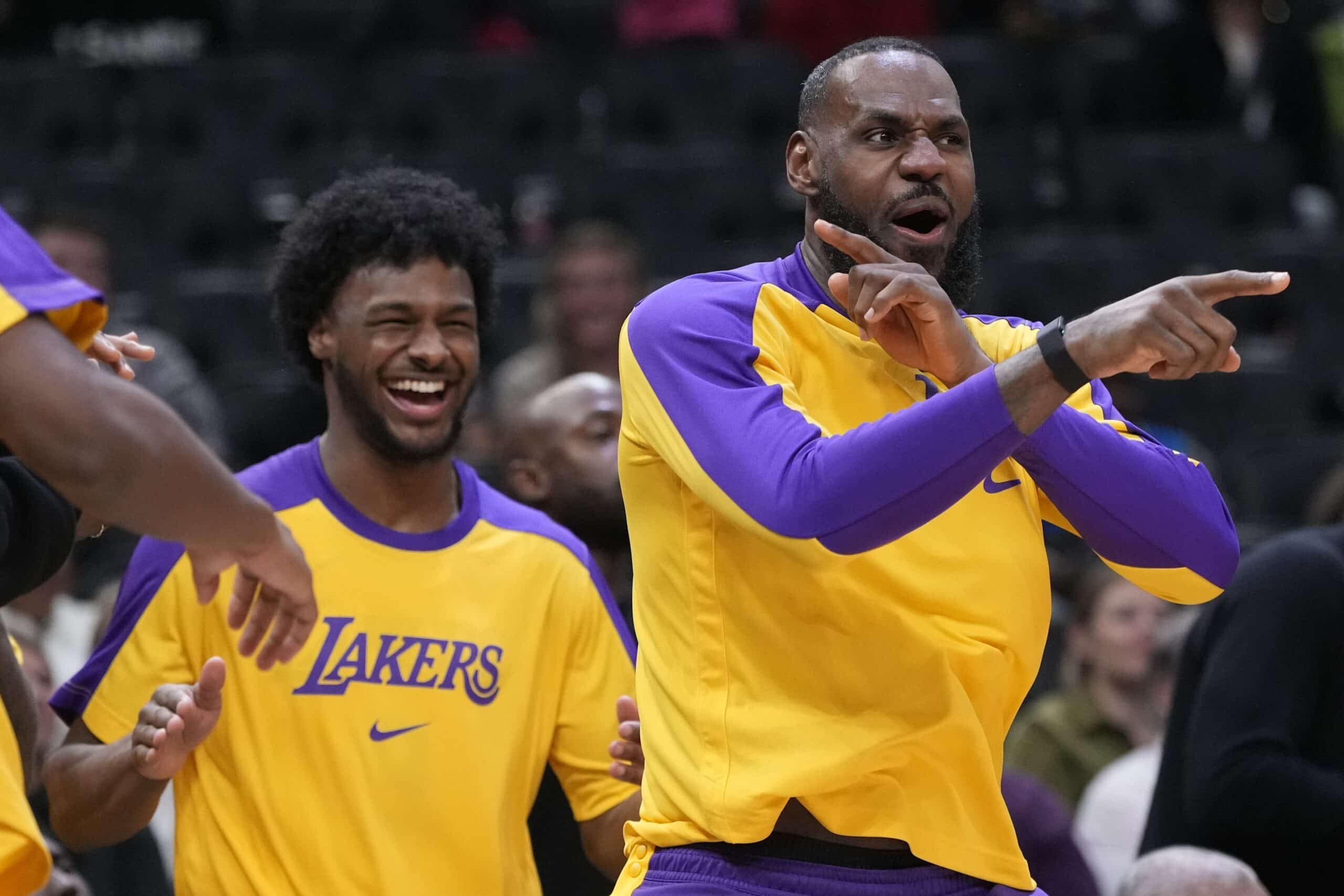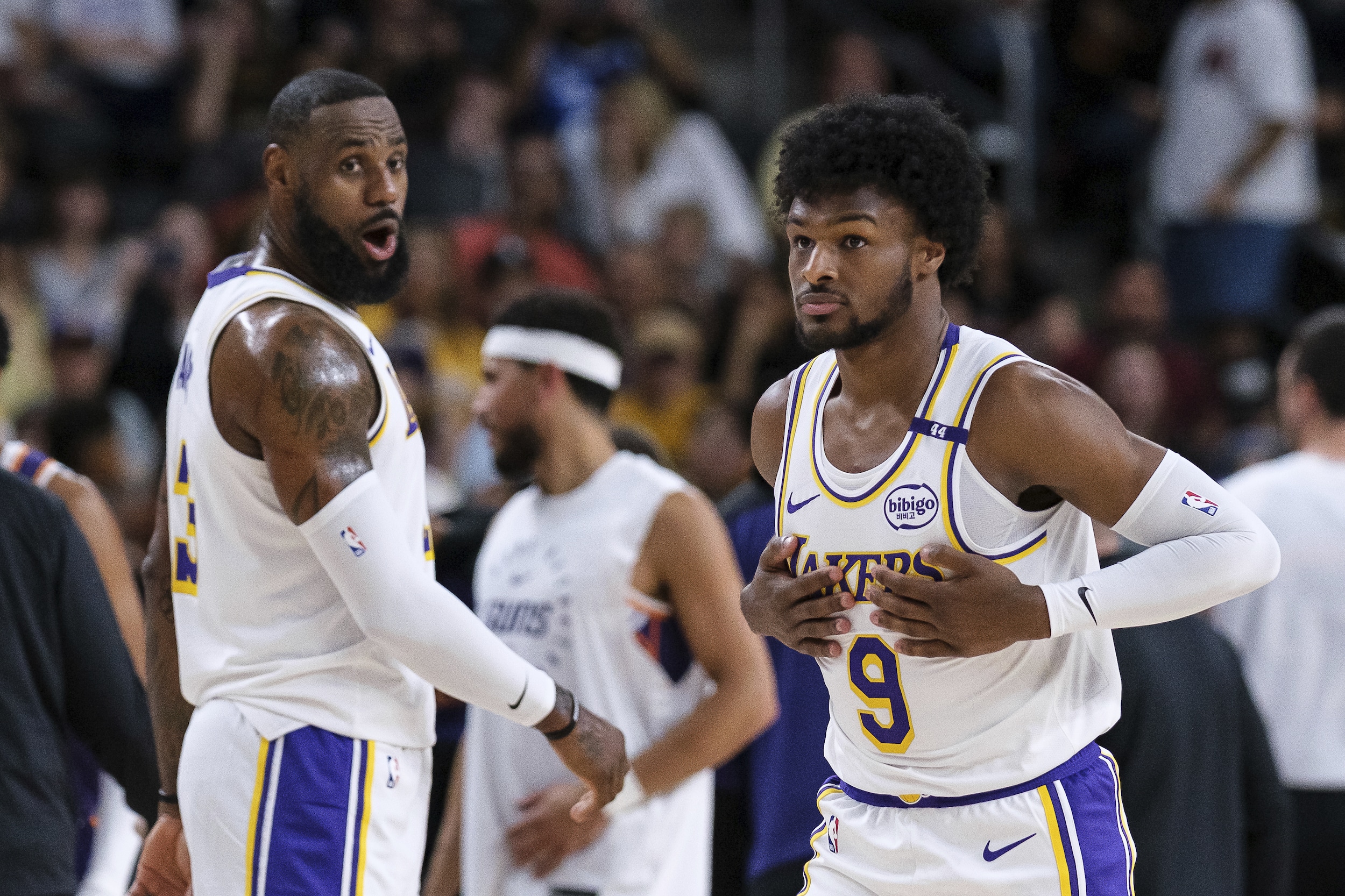
The Los Angeles Lakers’ LeBron James and Bronny James react on the bench during the second half of an NBA preseason basketball game against the Milwaukee Bucks on Thursday, Oct. 10, 2024, in Milwaukee. (AP Photo/Morry Gash)
LeBron James stood on the court next to his son Bronny and couldn’t help but look over at him to enjoy the moment. The duo wore matching Los Angeles Lakers jerseys with “James” and “James Jr.” They are embroidered on the back in large purple letters.
“It was like the Matrix or something,” LeBron said afterward. “It just didn’t feel real.”
Article continues after this ad
The Lakers helped James, 39, realize a years-long dream of playing alongside his son when they selected Bronny with the 55th overall pick in June, becoming the first father-son pair to play in an NBA game together game participated in a preseason matchup on October 6.
READ: Bronny James welcomes ‘new beginnings’ in NBA preseason debut
Lakers general manager Rob Pelinka has called the draft pick “magic,” while his organization has voiced criticism over whether Bronny would have earned the opportunity if his father hadn’t been one of the game’s greatest players. These objections, although they caused great excitement among the James family, renewed discussions about nepotism in sports and how powerful figures exploit their influence, while underscoring the stigmatization of children following in the footsteps of a successful parent or family member.
Article continues after this ad
“There will always be people who say things are nepotism,” said Alice Leppert, an associate professor of media and communications studies at Ursinus College in Pennsylvania. “There will be a cynical assumption that the strings have been pulled and that things are fundamentally not fair.”
READ: LeBron and Bronny James play together for the first time as Lakers
That’s often based on people’s desire to believe in a meritocracy, Leppert said, referring to the system in which someone gains status or rewards based on their abilities, not wealth or social status.
“In general, we don’t live in a meritocracy,” added Leppert. “We want to live in a meritocracy, and that’s why such debates exist.”
Critics of nepotism argue that those who do not have equal access to resources – producers and directors in the entertainment industry, scouts and training facilities in sports – are at a significant disadvantage when it comes to opportunities.
100 instances

Los Angeles Lakers guard Bronny James (9), right, steps onto the court with Los Angeles Lakers forward LeBron James (23) during the first half of a preseason NBA basketball game on Sunday, Oct. 6, 2024, in Palm Desert, California. (AP Photo/William Liang)
Others wonder why a practice so deeply rooted in society is even mentioned.
“I don’t want to hear these accusations, people talk about nepotism,” former ESPN NBA insider Adrian Wojnarowski said during the NBA draft. “The NBA is full of nepotism. The ownership level, front offices, coaching. I don’t want to suddenly hear it because Bronny James’ father plays for the Lakers. It’s very common in this league.”
READ: NBA: Lakers ponder when LeBron will share court with son Bronny
There have been about 100 cases in NBA history where players joined the league after their fathers played. These young men entered the league after their fathers’ careers ended, but they include Stephen and Dell Curry, Kobe and Joe “Jellybean” Bryant, Bill and Luke Walton, among others.
“I think we’ve come to terms in this country with the fact that if you own it, you can do whatever you want with it,” said David Grenardo, a law professor and sports law expert at the University of St. Thomas in Minnesota. “So I’m the owner. I can pass it on to my children… And that’s somewhat acceptable because that person has the right to do whatever they want with their property.”
This acceptance changes when it comes to athletes, said Grenardo.
“We are completely uncomfortable with the idea of someone getting a chance that they don’t deserve,” he said. “So when you’re in a situation where someone who may not be perceived as the best is given a chance over someone else… then the question becomes, ‘Whose child is this?'” Grenardo said.